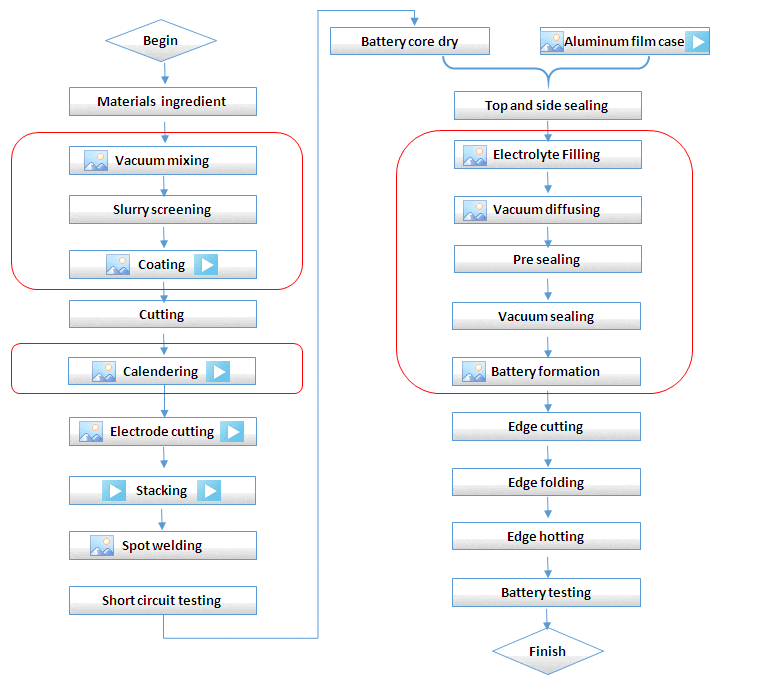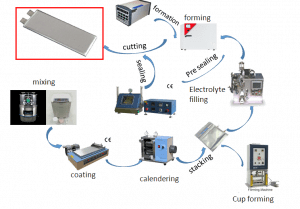The research and innovation in Dr. Qu’s group are well balanced with the scientific significance and potential practical application. Dr. Qu is particularly specializing at not only the fundamental academic research but also bridging it to the development and the production of new products by organizing technology transfer from the lab to the production.
Over 2000 square-feet state-of-the-art laboratories are dedicated to electrochemical, analytical and physical chemistry research.
To prove the concept, we are capable of making gas-diffusion-electrodes for both fuel cells and metal-air cells, thin coated electrodes, pallet electrodes and slurry electrodes. Bobbin design AA cells and pouch cells can be built in-house as well as various uniquely designed lab cells.
The advanced research lab includes sophisticated electrochemical instrumentation:
- Two Metrohm AutoLab (PGSTAT302N) with FRA2 modules.
- One Solartron (1287A Potentiostat and 1252A FRA).
- Two EG&G 4000 potentiostats (AC and DC)
- Two Bio-Logic 2-channel VMP potentiostats
- One EG&G 2273 Electrochemical Station (DC and AC).
- One EG&G 273 Potentiostat
- One Pine AFCBP1 Bipotentiostats with RRDE rotator
- PINE WaveNow Potentiostats
- One CH1660A potentiostat with pico-A booster and Faradic Cage
- One 12-Channel and one 8-channel Arbin Battery Testers
- One 8-Channel Maccor Battery Tester
Chemical and physical analysis capability:
- Burker D8 Advance X-ray diffractomete.
- Perkin Elmer optima 2100DV ICP-OEX spectrometer.
- Perkin Elmer AAnalyst 600 GFAA.
- Shimadzu HPLC w / Water Quattro LCMS.
- a Hiden Mass-Spectrometer (connected with the GC or used independently).
- Micromertics ASAP2020 porosimeter with physisoption (including H2 adsorption), chemisorptions.
- Perkin Elmer UV-visible spectrometer.
- Thermo DSC.
- Keyence microscopes and Optical Microscopes.
- pH and potentiometric titration
- Karl-Fisher titration
A laboratory with the capability of battery engineering design has been built in Professor Qu’s labs. The following equipment and capabilities are available:
- Three glove boxes with the capability of keep moisture, O2, H2 and N2 below 1 ppm
- Fisher glove boxes for chemical synthesis.
- MTI pouch cell sealer.
- Hosen coin cell sealer.
- Fuel Cell gas delivery system with 3 stations.
- MAZERUSTAR slurry mixer, Resodyn acoustic mixers, ultrasonic and high-speed mechanical homogenizers.
- Three Slurry coater (doctor blade and rod).
- High vacuum ultra-pure dry apparatus.
- Carver presses and a roller press.
- Tube furnace for material synthesis.
- Vacuum ovens, a high temperature oven and regular ovens.
- High Pressure Reactor for nano material synthesis.
An industrial level pilot scale automated porch cell production line is housed in a dedicated 600+ square-feet dry lab. Porch cell of various sizes (e.g. 3, 5 and 8Ah Li-ion cells) can be made from slurry mixing, electrode coating, calendering, cutting, stacking, electrolyte filling, sealing and finishing. Over 300-channel Arbine testers and environmental chambers (-80 – 250oC with humidity control) are used for the testing of finished cells and packages. It is the first and probably the only industrial level porch cell production line in academic higher education institutions.
600 square feet fully equipped advanced lead-acid battery research and development lab (lab images: central control, acid neutralization system, in-line GC-MS for in-situ gas analysis, density meter, QC for electrode plate, lead acid cell in testing,
multichannel Biologic ELectrochemical (AC_DC) station, Arbin battery testing system, lead acid test station) is housed in the university USR facility. The lab includes eight lead acid battery and lead electrode testing stations, 32-channel Arbine battery tester, four Bio-Logic electrochemical test stations (AC, DC with current booster) and chemical waste collection.
The full life cycle of battery development from fundamental research, prove-of-concept, bench-top validation and industrial level scale-up can be done in-house in professor Qu’s labs here in the College of Engineering and Applied Science in University of Wisconsin Milwaukee. This modern facility was built with the generous gift from Johnson Controls Inc.
Scale Up Production:

